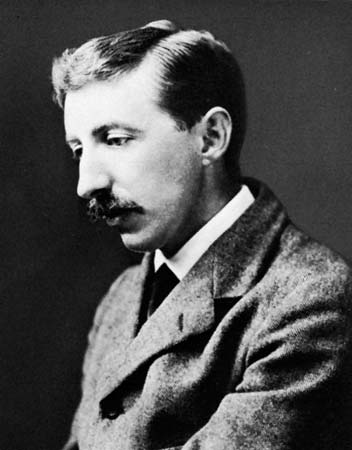Edward Morgan Forster was born in London on the first day of 1879. His father, an architect from a strict evangelical family, died of consumption soon after Forster was born, leaving him to be raised by his mother and paternal great-aunt. Because his mother was from a more liberal and somewhat irresponsible background, Forster's home life was rather tense. He was raised in the household of Rooksnest, which inspired Howards End. Forster was educated as a dayboy at the Tonbridge School, Kent, an experience responsible for a good deal of his later criticism of the English public school system. He then attended King's College, Cambridge, which greatly broadened his intellectual interests and provided him with his first exposure to Mediterranean culture, which counterbalanced the more rigid English culture in which he was raised.
Forster became a writer shortly after graduating from King's College. His first novels were products of that particular time -- stories about the changing social conditions during the decline of Victorianism. However, these earlier works differed from Forster's contemporaries in their more colloquial style and established the author's early conviction that men and women should keep in touch with the land to cultivate their imaginations. He developed this theme in his first novels, Where Angels Fear to Tread (1905) and The Longest Journey (1907), followed by the comic novel A Room With a View (1908), which concerns the experience of a young British woman, Lucy Honeychurch, in Italy.
However, Forster's first major success was Howards End (1910), a novel centered on the alliance between the liberal Schlegel sisters and Ruth Wilcox, the proprietor of the titular house, against her husband, Henry Wilcox, an enterprising businessman. The novel ends with the marriage of Henry Wilcox to Margaret Schlegel, who brings him back to Howards End, reestablishing the Wilcox land link. When composing this novel, Forster was part of the Bloomsbury Group, a set of unconventional British bohemian thinkers that included Virginia Woolf, John Maynard Keynes, Dora Carrington and Lytton Strachey.
Forster spent three wartime years in Alexandria doing civilian work and visited India twice. After he returned to England, inspired by his experience in India, he wrote A Passage to India (1924). The novel examines the British colonial occupation of India, but rather than developing a political focus, explores the friendship between an Indian doctor and British schoolmaster during a trial against the doctor, based on a false charge. A Passage to India is the last novel Forster published during his lifetime, but two other works remained, the incomplete Arctic Summer, and the unpublished complete novel Maurice, which was written circa 1914, but published in 1971 after Forster's death. Forster specifically requested the novel be published only after his death due to its overt homosexual theme.
Although Forster published no novels after A Passage to India, he continued to write short stories and essays until his death in 1970. He published several anthologies, including The Celestial Omnibus (1914) and The Eternal Moment (1928), two collections of short stories, Abinger Harvest (1936), a collection of poetry, essays and fiction, and several non-fiction works. Forster also wrote the libretto to the Benjamin Britten opera "Billy Budd." The essays by Forster as well as his frequent lectures on political topics established his reputation as a liberal thinker and strong advocate of democracy. Forster was awarded membership in the Order of Companions of Honor in 1953 and received the Order of Merit from Queen Elizabeth in 1969. He died in June of 1970 after a series of strokes.
Today, many people know of E.M. Forster due to the many film adaptations of his work. Titles by Forster that are immortalized not only on the page but also on film include A Passage to India (1984), A Room with a View (1986), Where Angels Fear to Tread (1991), and Howards End (1991). It is ironic that so many of his titles were made into movies, many with great success, as throughout his life he remained adamant about the difficulty of adapting books to stage or film. In 1919, he contributed regularly to the London literary magazine "The Athenaeum", often criticizing various attempts to convert written work to the stage. For him, the individual experience of reading a book was something that could not be captured in another form of media. Despite his beliefs, many of the film adaptations of Forster's work were met with widespread enthusiasm and praise, including multiple Academy Award nominations.






 رد مع اقتباس
رد مع اقتباس